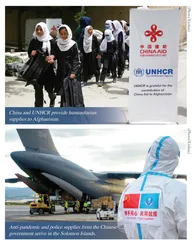Building a Shared Future: Perception and Action
作者: Wang Yuzhu

The development of human society towards globalization is in fact a process towards a community of shared destiny. However, humanity is easily blinded by local, individual and short-term interests, and the interests of the community are therefore neglected. Meanwhile, the constant global crises that challenge the common interests of mankind have cast a spotlight on the fact that humanity shares common destiny. Preliminarily, the building of the community with a shared future for mankind requires progress from awareness to recognition, and giving priority to common interests. While perception can only transform into action through sincere cooperation among all parties and joint efforts towards the ultimate goal of peace, security and prosperity.
Global Crises Highlights Common Destiny
The history of humanity is one towards a common destiny. In the process of globalization, division of labor and cooperation among people from different regions and ethnic groups have intensified, thus deepening interdependence within humanity and fostering a community with a shared future.
I. Common Challenges Underline Common Destiny
The destiny of humanity is elementarily dependent on the combination of interests at multiple layers. Interests concerning human destiny, micro or macro, short-term or long-term, and local or overall, cannot always be achieved without conflicts. However, it is an objective fact that all human beings share common destiny. Specially, in the face of global crises, they usually put aside conflicting interests and divisions and reconnect with the value of the community. From natural disasters like pandemics, earthquakes or tsunamis to man-made disasters such as wars and global or regional economic and financial crises, the enormous catastrophic impacts on human society and the sense of crisis stimulate our kind to break free from the shackles of local, short-term and micro interests, thus incenting a shift from egocentrism to the awareness of the community.
This role of crisis is particularly clear in regional cooperation. In East Asia, for example, the global spread of COVID-19 illustrates the nature of humanity as a community with a shared future. For one thing, the virus is spreading rapidly around the world, attacking humanity indiscriminately, recognizing no borders, systems, races or religions; for the other, the pandemic is severely disrupting the normal functioning of global production networks. With the supply chains cut, global economy declines in a dramatic manner, which has made all countries feel their high dependence on the common economic system.
The current international situation remains complex. The Russia-Ukraine conflict continues with each side fighting for its self-justified interests and taking the other as the destroyer of interests and enemy against the future. Nevertheless, however much the warring parties may hate each other, they cannot escape their common destiny because they are both at war and equally harmed by it. Moreover, the war raised the prices of bulk commodities such as oil, gas and food, which swiftly spread to every corner of the world and once again remind the world of the interdependence of human destiny.
II. Giving Priority to Common Interests
The awareness of shared future doesn’t necessarily generate action in the interests of it. The crisis-response nature of shared destiny means in reality when things go well, nations, communities, social groups and so on tend to ignore others who share with them the same community. Worse still, even when people realize that shared community is real existence, they do not necessarily develop a consciousness to defend the common good. After all, before humans think about the ultimate proposition of the community’s destiny, they are often faced with many specific, microscopic and more immediate options for interests. For groups already divided in nations, regions, faiths and other titles, all the interests are not in harmony, but arguably in most cases they contradict with each other.
In a context where human survival is increasingly dependent on limited resources, a zero-sum game mentality and relative gains orientation has been highly sought after by certain powers in international relations. In China-U.S. relations, for example, the U.S. sees fast-developing China as a challenger with an opposing destiny. The Trump administration had, for this reason, ignored the fact that the economic interests of China and the United States are deeply interdependent and launched a blatant trade war to contain China’s development. The Biden administration has also continued this logic, both with its previously aggressive Indo-Pacific strategy and its recent efforts to build an Indo-Pacific Economic Framework, whose essence still lies in the containment of China.
To some extent, the community with a shared future for mankind is a politics of recognition. In practice, recognizing the community requires putting the common good of humanity first and foremost, making it the first logical starting point for actions. But this is not easy to achieve. The existence of the free-rider phenomenon shows that acting in the common good of humanity is not the first choice of rational actors. For example, in the case of the global prevention and control of the COVID-19, the international community, particularly developed countries, needs to provide vaccine assistance to developing countries in order to bridge the immunization gap. However, because of the huge costs of vaccine production and transportation, vaccine aid from developed countries is always lip service. In short, it is precisely because translating the cognition of a community with a shared future from position to action requires a price to pay, i.e., the expense of local and short-term interests. Consequently, the building of such a community tends to remain a rhetorical exercise. In view of this, the building of such a community requires transformation of perception into action.